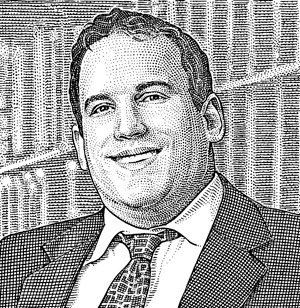Edward Haas ’95 Fights Discrimination in New Jersey
By Kate Helm
WHILE THE COUNTRY has come a long way in the areas of civil rights and discrimination prevention, it’s the work still to be done that gets Edward H. Haas ’95 up in the morning. A deputy attorney general in the New Jersey Department of Law and Public Safety’s Division on Civil Rights, he is making a difference in peoples’ lives by upholding the New Jersey Law Against Discrimination.
Haas’ family history and personal experience inform his role protecting the public. He is the son of Croatian immigrants who left the former Yugoslavia in the 1960s. On his mother’s side, many family members were murdered in the Holocaust. “My parents taught me to fight for those who are underrepresented or discriminated against,” he says.
 Haas also has cerebral palsy. After earning his J.D. at the University of Richmond’s T.C. Williams School of Law, he published a lead article in the Seton Hall Constitutional Law Journal on Thurgood Marshall, whom he called “an indispensable voice in the struggle for the civil rights of people with disabilities.” He quotes the Supreme Court’s resolution in memory of Marshall: “He humanized legal theories and dared to challenge the morality of law that crushed the human spirit. . . . Thank you, Mr. Justice Marshall, for opening our hearts and never letting us forget that our society can only succeed when the least among us have the same opportunity as the most privileged.”
Haas also has cerebral palsy. After earning his J.D. at the University of Richmond’s T.C. Williams School of Law, he published a lead article in the Seton Hall Constitutional Law Journal on Thurgood Marshall, whom he called “an indispensable voice in the struggle for the civil rights of people with disabilities.” He quotes the Supreme Court’s resolution in memory of Marshall: “He humanized legal theories and dared to challenge the morality of law that crushed the human spirit. . . . Thank you, Mr. Justice Marshall, for opening our hearts and never letting us forget that our society can only succeed when the least among us have the same opportunity as the most privileged.”
Marshall, he says, “fought in the trenches for better rights.” Now Haas is in the trenches, helping the civil rights division fulfill its mission of eradicating illegal discrimination based on race, religion, color, national origin, handicap, age, nationality, ancestry, marital status, domestic partnership status, familial status, affectional or sexual orientation, and sex in areas such as employment, public accommodations, and housing. “If illegal discrimination negatively affects any one individual in New Jersey, it negatively affects every individual in New Jersey,” the division’s mission statement maintains.
Haas’ duties have evolved from conducting investigations to drafting director’s orders and motions and advising investigatory staff and management. While living with cerebral palsy gives him a distinctive perspective on those who face discrimination, his priority is to enforce the state’s anti-discrimination law impartially and uphold its integrity.
“People come to a government agency because they have nowhere else to turn. They’re frustrated and don’t have the money to hire a private attorney. I’ve been there, dealing with bureaucracy taking awhile, even under good circumstances. I live the work I do,” he says, adding, “Proving discrimination has become much more challenging because most of the time harassment is not as blatant as it used to be. Those who choose to discriminate have gotten better at hiding it, so it becomes more difficult to prove. Unless people experience or feel they’ve experienced discrimination, it doesn’t necessarily spark others into action or make those unaffected by it feel it’s as important as it once was.” (He says his statements are his personal views and opinions and not intended to reflect those of the Christie administration, State of New Jersey, Office of the Attorney General, Department of Law and Public Safety, or Division on Civil Rights.)
“I have had to advocate for myself since I was very young because I went to school before the Americans with Disabilities Act,” says Haas, who also holds a master’s degree in social work from Virginia Commonwealth University.
A double major in psychology and Spanish and a member of Student Government at Lafayette, he coordinated an annual Disability Awareness Day on campus for three years to open fellow students’ eyes to life with a disability. On at least one occasion, his math teacher, Associate Professor Rob Root, taught his classes from a wheelchair. Haas and Root formed a bond that continues.
“I’d walk up the stairs to Rob’s calculus class in Olin Hall with one hand on the railing and one hand lifting my walker. Every day after class, he would carry my walker down the stairs and come back and give me his hand.”
In addition to being a guest speaker in Root’s First-Year Seminar on mathematics and social justice, Haas has been speaking at conferences, workshops, meetings, and other forums related to disability issues for more than 15 years.
“I could have gone into private practice, but I wanted to work within the system and try to effect positive change where I could,” he says. “The hardest part is to not become jaded and burn out, and to remember that I’m not just pushing papers. I’m trying to effect change in somebody’s life.”